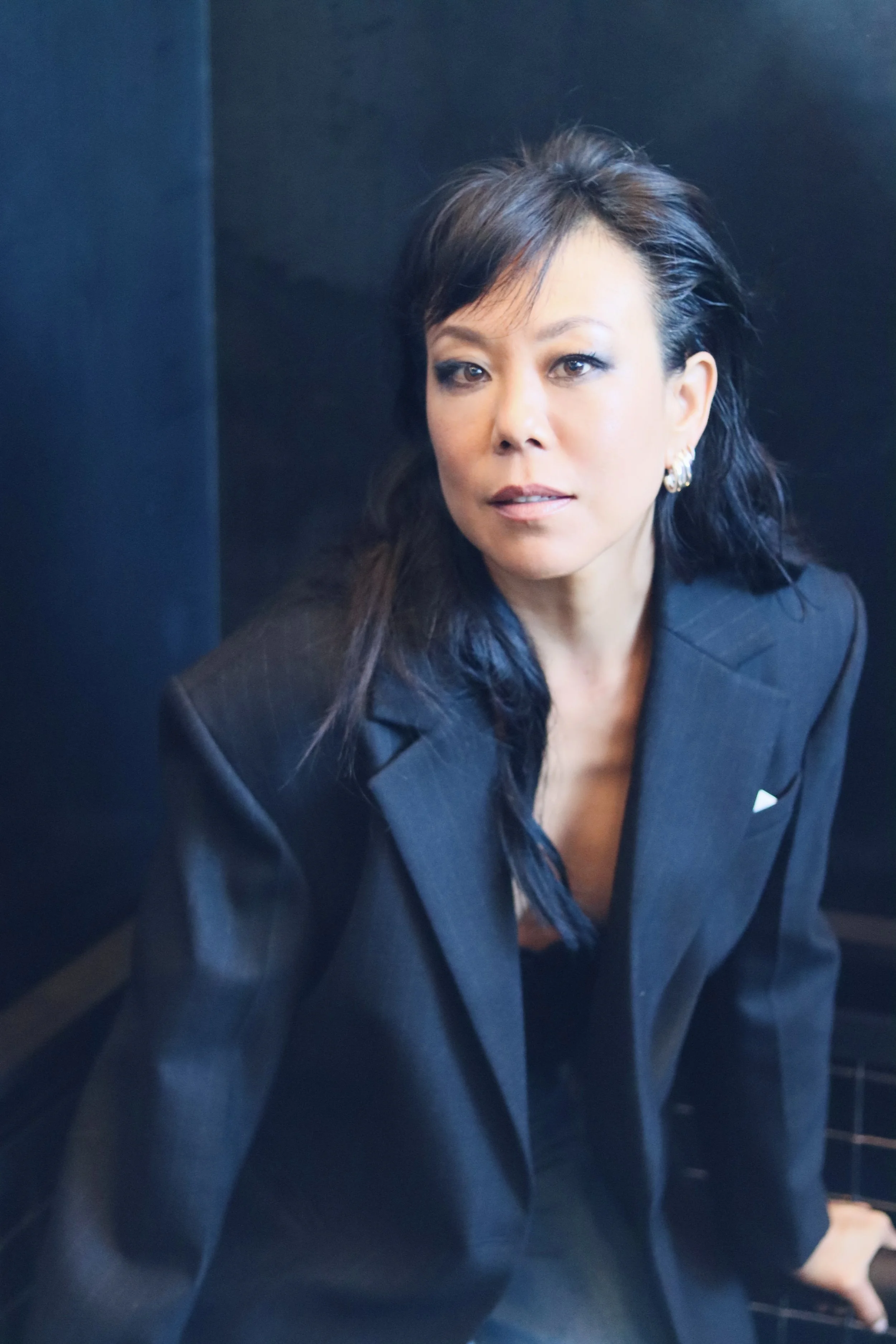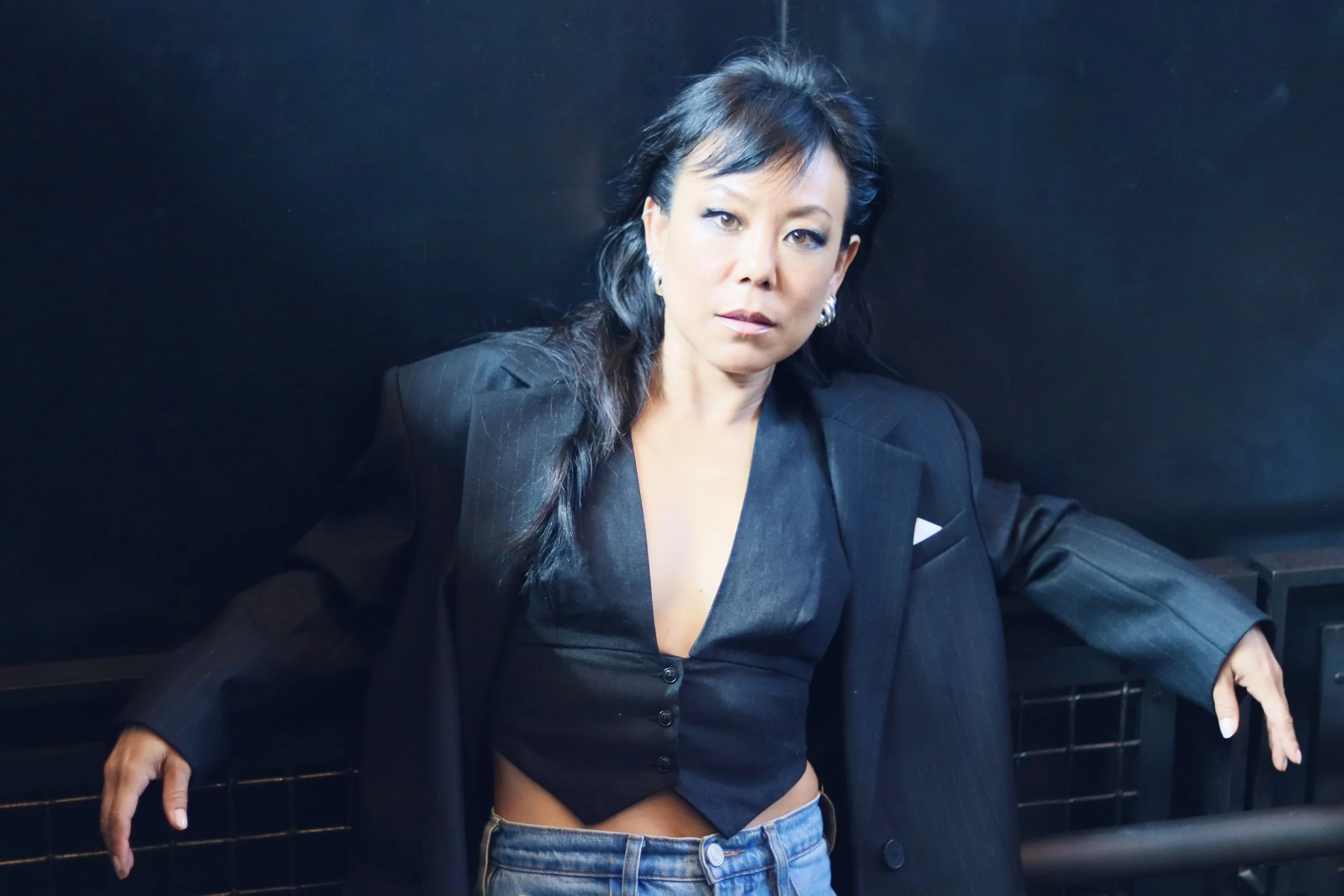IN CONVERSATION WITH ALI AHN
interview by JANA LETONJA
photography by TINA TURNBOW
Ali Ahn is having a career-defining moment with standout roles across both television and film. She currently stars as Eidra Park, the formidable CIA Station Chief in Netflix’s hit political thriller ‘The Diplomat’, returning in October 2025 for Season 3, where her character takes on even greater significance amid global intrigue. Known for bringing quiet control and emotional depth to her performances, Ali has also left her mark in Marvel’s ‘Agatha All Along’, ‘Raising Dion’, ‘The Path’, and ‘Billions.’
You’re returning in the third season of ‘The Diplomat’. What initially drew you to the role of Eidra Park?
Her sense of humor was what stood out to me in a script filled with really smart people doing really important things. To be honest, I didn’t know much about Eidra from reading the pilot, but I knew right away that the writing was great. The dialogue was dynamic and funny, and the scenes read almost like a play in terms of how much time it spent with the characters. And then when I met Deb, our showrunner, and saw not only how brilliant she was, but also how invested she was in curating a kind work environment, I was on board.
In Season 3, the CIA’s involvement deepens and Eidra becomes even more central. What can you share about her evolution?
I don’t think Eidra has dealt with the kind of failure that she is confronting at the beginning of Season 3. She has nothing to show for the risk she took breaking protocol and the reality that she is probably going to lose her job is devastating. Eidra’s entire adult life has been in service to her career and this kind of setback is shocking for someone who has been a phenom from the beginning. In Season 2, she can channel whatever relationship angst she has back into work. But this season, Eidra is on the verge of losing everything she’s worked towards so she is in a pretty raw and vulnerable place.
Eidra is described as a no-nonsense leader with quiet control. How do you approach playing someone with so much composure under pressure?
I focus a lot on her physical composure and the confidence that stillness projects. And to do that, I have to excise as much of my own nervousness as I can so I have a shot at presenting as a badass. I also try to be really clear about what Eidra’s processing internally so that I have something to actually hide, otherwise there’s no tension underneath her external quiet. The audience has to feel like she’s withholding something. I’ve said this before, but what that often boils down to is reminding myself to just relax my face. I’ve been told I have resting bitch face so I think that does a lot of the work for me.
You’ve played characters across genres—superheroes, political thrillers, family dramas. How do you decide what roles to take on?
Most actors don’t have a choice as to what roles they take. There are the roles you want and the roles you get, and most of us probably wish there was more overlap. I just look for whether there’s room for me to try something different than the last role I played. I always want to mix things up and grow in some way, whether that’s working in a different genre or working with someone I admire. But if the writing is good, those priorities go out the window and I’ll play a damn tree.
When you step into a character like Eidra, how much of yourself do you bring into the role?
I wish I could tell you that I’m a boss bitch in real life, but I’m not. The only thing I’m the boss of is my dog, who is a rescue and more of a people pleaser than I am. But I do think with any role, you have to find something you personally relate to in the character to anchor yourself. I understand her sarcasm, her bite, and I did give a lot of thought to what about me in real life would make me a good spy. Turns out not much. But I’m a good judge of character, and anticipating people’s needs. And, I’m a hard worker, or so I’d like to think. So, that’s my way in. But what helps me play Eidra is actually focusing on our differences. She is way more confident and her affect is flatter, less excitable. She doesn’t need anyone’s validation. Eidra knows what she brings to the table, whereas self-deprecation is basically my entire personality.
Marvel fans loved seeing you in ‘Agatha All Along’. How did that experience compare to your work in ‘The Diplomat’?
That show required a very different physicality than ‘The Diplomat’ and the work was more sensorial and improvisational. It’s a show about witches, it almost necessitates a wilder, woolier process. I shot ‘Agatha All Along’ in the hiatus between the first and second season of ‘The Diplomat’, so that magnified how different those two shows felt to make. One week I was cramming really technical and precise dialogue in my brain and the next I was running barefoot from imaginary creatures and processing generational trauma through song. It was demanding in a totally different way and required a rawness and emotionality that is almost the exact inverse of the vibe on ‘The Diplomat’, where all the characters are working very hard to compartmentalize their feelings.
How do you hope your roles contribute to more nuanced portrayals of women in positions of power?
Would love to see more stories about the emotional lives of powerful women, rather than having those characters’ entire personality and presence on screen be defined solely by their job. We don’t often get to know much about that character beyond how “boss” she is, how efficient and ruthlessly good she is at her job, especially when portrayed by an actress of color. I get that women have been, and still are, fighting just to be seen as qualified and capable at work, but I hope that the conversation can continue to evolve and that the thing we find most interesting or surprising about a female character is not the fact that she has a high-powered job. It’s reductive and frankly, boring. I’m way more interested in what makes a powerful person nervous. I want to see portrayals that look more like the US weekly section “Celebrities, they’re just like us!”
When you look back at your body of work so far, which role feels most personally significant to you?
I’m going to say the role of Susan in ‘The Heidi Chronicles’. I was in a tough spot personally, so that job was a real Hail Mary moment. I was living in an illegal basement, after having moved cross country twice within a year, and I was really questioning my life choices as people would come downstairs to what was essentially my living room to do their laundry. That was probably the closest I got to giving up on being an actor. Getting the call that I was going to be on Broadway opposite Elisabeth Moss felt like I was being spared. It was the first time that I was spending more time acting than working my day job, which was huge.
What can you share with us about your other upcoming projects?
I shot an action movie called ‘Pig Village’ with Don Lee that I really hope American audiences get to see. We filmed mostly in Korea, but the movie is in English and it was amazing to be part of an international collaboration like that and make a movie in the country my family is from. I also just wrapped an indie that I’m really excited about. It’s called ‘Take Me Home’, directed by Liz Sargent. It follows Anna, a disabled caregiver to aging parents, and stars Liz’s actual sister who is disabled and who the film is inspired by. I’ve never been involved in a project like this and the way it grapples with questions around caretaking and accessibility are so important. It was a labor of love for everyone involved. I can’t wait for the world to see Anna’s work in this. She’s incredible.


